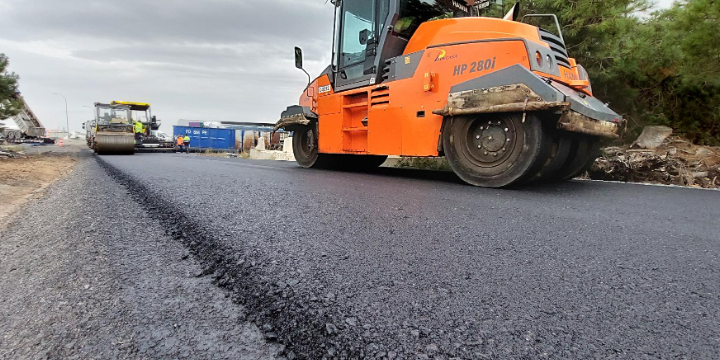Abertis recycles and reuses 80% of its waste, boosting the circular economy

•The Group places a strong focus on waste management and revaluation and the use of new materials. Since 2022, it has been encouraging the use of plastic waste pavement on the service roads of some of its motorways, guaranteeing environmental sustainability and improving the durability, abrasion resistance and flexibility of the asphalt.
•The Group is also promoting the incorporation of other recycled materials into its motorway operations, such as rubber in Brazil and Mexico, vegetable resins in France and RAP (Recycled Asphalt Pavement) in Italy, France, Chile and Brazil.
•In Spain, Autopistas, the Abertis subsidiary in the country, has launched a pilot project with the Alfonso X el Sabio University to reuse and recycle milling-generated asphalt in its roads.
19 September 2024.- Abertis is making headway in promoting the circular economy, one of the main pillars of its sustainability strategy, which will run until 2030. Following this roadmap, the Group already recycles and recovers 80% of its waste, after having improved the selection and recycling processes derived from toll road management. Along these lines, the company has deployed an Environmental Management System in all its business units that lets it control how each of its waste products is handled, with the aim of maximising the percentage of waste recycled.
This has entailed installing collection points for conventional and hazardous waste in many of the maintenance areas of the different motorways. It has also awarded new contracts to specialised waste management companies in various countries.
Pavements with plastic, vegetable pine resin and other recycled materials
Another of Abertis' main commitments is using recycled materials and reusing milling material in pavements, without affecting infrastructure durability and safety. One such initiative, which the Group has been promoting since 2022 through the JEPL concession in India, consists of using pavement containing recycled plastic. This option reduces the environmental impact without impairing surface stability and flexibility, boosting efficiency.
Abertis is also promoting the incorporation of other recycled materials in motorway operations, such as rubber in Brazil and Mexico, RAP (Recycled Asphalt Pavement) in Italy, France, Chile and Brazil, and vegetable pine resin in France.
Specifically in Spain, Autopistas, the Abertis Group's subsidiary in the territory, has launched a pilot project for the reuse and recycling of asphalt on its roads. This initiative, carried out in collaboration with the PADECASA-Universidad Alfonso X el Sabio Chair, consists of building a test section reusing asphalt from milling layers that need to be renewed, recovered at different rates or percentages, with the aim of analysing and validating its performance on motorway surfaces and pavements.
All these projects, which are part of the Abertis' sustainability plan devised to mitigate climate change effects and promote a circular economy, make it possible to reuse milled material waste and encourage the consumption of materials from waste from other activities.
"Material recycling has become vitally important, especially in paving works, as they involve consuming far more materials," says Georgina Flamme, Sustainability Director at Abertis. "That is why we are making a strong commitment to promoting the use of recycled options in most of the countries where we are present, with path breaking proposals that maintain the same performance and lifespan as a conventionally reconstructed pavement. We are sharing the results with all our business units to promote these new formulas and replicate them throughout our road network".
In 2023, the Science Based Targets (SBT) initiative validated Abertis' greenhouse gas emission reduction targets. This scientific criteria-based scheme confirms that its targets for reducing its carbon footprint - greenhouse gas emissions - through plans to promote the circular economy, green energy, etc., are in line with the Paris Agreement.
Share
Related news
The Abertis Foundation and UNICEF’s strategic alliance has impacted the road safety of 1.9 million children and young people around the world
10 December 2024
•This partnership kicked off in 2017 with the launch of the "Rights of Way" project to promote safer and more sustainable mobility among the most vulnerable children and young people.
•Since then, the alliance has also been backing a Mexican programme designed to help girls and teenagers between 12 and 16 years old from high-poverty municipalities to access STEM education, so as to empower female talent in areas such as infrastructure and road safety.
10th December 2024.- The Abertis Foundation has been working closely with UNICEF since 2017 as part of its firm commitment to fighting one of the main ...
His Majesty the King presides over the ceremony to commemorate the Abertis Foundation’s 25th anniversary
3 December 2024
•The celebration took place at the Círculo de Bellas Artes in Madrid and was attended by the Minister for Inclusion, Social Security and Migration, Elma Saiz; Elena Salgado, president of the Abertis Foundation; Juan Santamaría, president of Abertis; José Aljaro, CEO of Abertis; accompanied by representatives from the social, political and economic spheres who have formed part of the Abertis Foundation over its 25-year history.
Madrid, 3rd December 2024.- The Abertis Foundation celebrated its 25th anniversary with a commemorative event at the Círculo de Bellas Artes in Madrid, which was presided over by His Majesty King Felipe VI and attended ...
